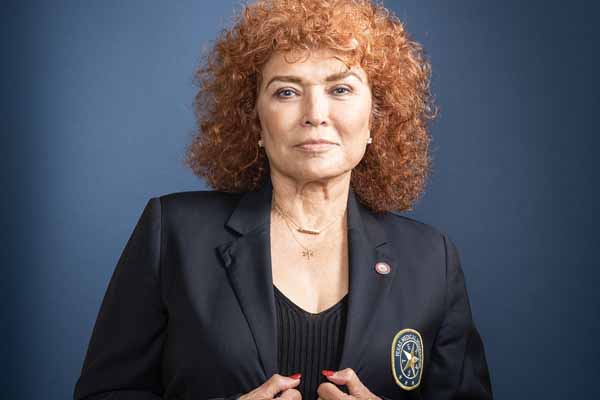
Early in her tenure as the Texas Medical Association’s 2021-22 president, Edinburg internist E. Linda Villarreal took advantage of the temporary dip in COVID-19 case numbers and the attendant wave of new hope, as vaccines became widely available to the general public in spring 2021.
The third president to serve during the ongoing pandemic, she was eager to resume in-person events and visits. After a virtual installation ceremony, she hopped into the passenger seat of her little red Jaguar, working on her computer as her husband drove her to Tyler, Pearland, and other small communities across Texas. During these trips to county medical societies, Dr. Villarreal – or Dr. V, as she’s commonly known – was heartened to see strong turnout, especially among younger physicians, despite mounting pandemic pressures.
“As some of us old dinosaurs are looking to retire, we worry about who’s going to take our place, who’s going to grow up in the profession of medicine and become a dinosaur like I did,” she said.
She used to fret about employment shifts, as more physicians eschewed private practice for salaried positions at hospitals and health systems, and about the erosion of the patient-physician relationship. But after visiting with her colleagues, both in person and virtually, she is optimistic about the future of medicine. “It was so enlightening to me,” she said.
This two-way street between TMA’s membership and its leadership is emblematic of Dr. Villarreal’s presidency, which she says focused on innovation, collaboration, and conversation.
The innovation piece stems from supporting new ideas, such as shifting House of Delegates business online during last year’s multiple legislative sessions, promoting the COVID-19 vaccines and therapeutics that were rolled out, and encouraging the continued use of telemedicine. Then, she needed to collaborate with the TMA Board of Trustees, her physician colleagues, and others in organized medicine to get those ideas off the ground, even when they seemed unfamiliar or risky. Finally, she had to follow up – in conversation – to see how those ideas were taking root or, if they were flailing, what could be done to help them do so.
“This presidency has taught me a lot,” she said. “I have become more patient. I have become more of a listener. I am [more] reachable now.”
Carrying on the work of her predecessor Diana Fite, MD, Dr. Villarreal also presided over the tail end of an unprecedented legislative session that included multiple pandemic challenges but mostly victories for medicine. Dr. Villarreal also oversaw a grassroots effort that staved off yet another threat of Medicare payment cuts; a court challenge to an unfair rule implementing the federal surprise billing law; and implementation of a new law that fully funds graduate medical education in Texas.
She herself testified on the need to bolster access to care on the border and lent her voice to the chorus of TMA members speaking out against proposed scope-of-practice bills and attempts to undercut Texas’ 2003 tort reform legislation.
“It’s an ongoing battle every legislative session, so we can’t let our guard down,” she said.
Dr. Villarreal knows firsthand how important this advocacy is in rural and border regions, like Edinburg, where physicians are already in short supply. Had they not been averted, she says the proposed cuts to Medicare payments and graduate medical education funding could have driven border physicians to more populous parts of the state, where more patients are insured by private payers, and reduced the number of residency positions in the Valley.
“It all kind of connects together, starting with the availability of the physician workforce,” she said.
Her own struggles entering medicine are what made her a better physician and equipped her to serve as TMA president, she says. (See “From the Valley to the Top,” May 2021 Texas Medicine, pages 16-21.) Plus, being open about those struggles has helped to collapse any distance between her and her fellow Texas physicians.
“I want to make them feel that they can talk about [their own struggles],” she said.
As Dr. Villarreal prepares to pass the baton to incoming TMA President Gary Floyd, MD, at TexMed 2022, she is excited to spend more time with her family, including her seven grandchildren. (See "Natural-Born Healer," page 18.) “[My] two little boys, now grown men, asked, ‘So when do you get dethroned? ’Cause we want to go [to the ceremony],’” she said.
Dr. Villarreal shares their celebratory spirit, saying it has been an honor to have served as TMA president, especially during such a tumultuous period. “I’m in TMA history, you know?” she said.
She’s also proud to leave the association in such good hands, both those of Dr. Floyd and those of member physicians.
“I am not fearful that I, as a patient, will be able to find a physician who will care for me as I have cared for my patients,” she said.
Although her term is coming to a close, Dr. Villarreal says her commitment to organized medicine will continue unabated. She won’t stop advocating on behalf of physicians until she loses her license. “And I will no longer have a license when they bury me in my little red Jaguar.”
Tex Med. 2022;118(3):24-25
April 2022
Texas Medicine Contents Texas Medicine Main Page